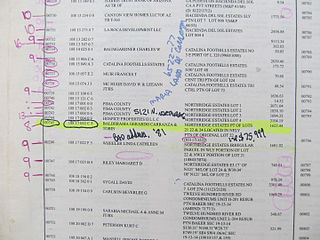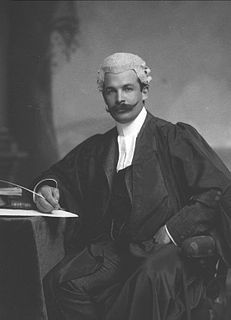A deed poll is a legal document binding only to a single person or several persons acting jointly to express an active intention. It is, strictly speaking, not a contract because it binds only one party and expresses an intention instead of a promise.

A non-disclosure agreement (NDA), also known as a confidentiality agreement (CA), confidential disclosure agreement (CDA), proprietary information agreement (PIA) or secrecy agreement (SA), is a legal contract between at least two parties that outlines confidential material, knowledge, or information that the parties wish to share with one another for certain purposes, but wish to restrict access to or by third parties. The most common forms of these are in doctor–patient confidentiality, attorney–client privilege, priest–penitent privilege, and bank–client confidentiality agreements.
In property law, a title is a bundle of rights in a piece of property in which a party may own either a legal interest or equitable interest. The rights in the bundle may be separated and held by different parties. It may also refer to a formal document, such as a deed, that serves as evidence of ownership. Conveyance of the document may be required in order to transfer ownership in the property to another person. Title is distinct from possession, a right that often accompanies ownership but is not necessarily sufficient to prove it. In many cases, both possession and title may be transferred independently of each other. For real property, land registration and recording provide public notice of ownership information.
A mortgage is a security interest in real property held by a lender as a security for a debt, usually a loan of money. A mortgage in itself is not a debt, it is the lender's security for a debt. It is a transfer of an interest in land from the owner to the mortgage lender, on the condition that this interest will be returned to the owner when the terms of the mortgage have been satisfied or performed. In other words, the mortgage is a security for the loan that the lender makes to the borrower.

An indenture is a legal contract that reflects or covers a debt or purchase obligation. It specifically refers to two types of practices: in historical usage, an indentured servant status, and in modern usage, it is an instrument used for commercial debt or real estate transaction.

A tax lien is a lien imposed by law upon a property to secure the payment of taxes. A tax lien may be imposed for delinquent taxes owed on real property or personal property, or as a result of failure to pay income taxes or other taxes.
A real estate contract is a contract between parties for the purchase and sale, exchange, or other conveyance of real estate. The sale of land is governed by the laws and practices of the jurisdiction in which the land is located. Real estate called leasehold estate is actually a rental of real property such as an apartment, and leases cover such rentals since they typically do not result in recordable deeds. Freehold conveyances of real estate are covered by real estate contracts, including conveying fee simple title, life estates, remainder estates, and freehold easements. Real estate contracts are typically bilateral contracts and should have the legal requirements specified by contract law in general and should also be in writing to be enforceable.

Recorder of deeds or Deeds registry is a government office tasked with maintaining public records and documents, especially records relating to real estate ownership that provide persons other than the owner of a property with real rights over that property.
Closing is the final step in executing a real estate transaction.
A quitclaim deed is a legal instrument that is used to transfer interest in real property. The entity transferring its interest is called the grantor, and when the quitclaim deed is properly completed and executed, it transfers any interest the grantor has in the property to a recipient, called the grantee. The owner/grantor terminates (“quits”) any right and claim to the property, thereby allowing the right or claim to transfer to the recipient/grantee.
A partition is a term used in the law of real property to describe an act, by a court order or otherwise, to divide up a concurrent estate into separate portions representing the proportionate interests of the owners of property. It is sometimes described as a forced sale. Under the common law, any owner of property who owns an undivided concurrent interest in land can seek such a division. In some cases, the parties agree to a specific division of the land; if they are unable to do so, the court will determine an appropriate division. A sole owner, or several owners, of a piece of land may partition their land by entering a deed poll.

Consideration is a concept of English common law and is a necessity for simple contracts but not for special contracts. The concept has been adopted by other common law jurisdictions, including the US.

The Virginia gubernatorial election of 2009 took place in Virginia on November 3, 2009. The incumbent Governor, Democrat Tim Kaine, was not eligible to run due to term limits established by the Virginia Constitution, though others in the state's executive branch were not restricted. The election elected Republican Bob McDonnell as the next Governor, re-elected Bill Bolling as Lieutenant Governor, and elected Ken Cuccinelli as the next Attorney General of Virginia. The winners were inaugurated on January 16, 2010, and were scheduled to serve until January 11, 2014.

An equitable interest is an "interest held by virtue of an equitable title or claimed on equitable grounds, such as the interest held by a trust beneficiary." The equitable interest is a right in equity that may be protected by an equitable remedy. This concept exists only in systems influenced by the common law tradition, such as New Zealand, England, Canada, Australia and the United States.
In real estate in the United States, a deed of trust or trust deed is a deed wherein legal title in real property is transferred to a trustee, which holds it as security for a loan (debt) between a borrower and lender. The equitable title remains with the borrower. The borrower is referred to as the trustor, while the lender is referred to as the beneficiary.
An easement is a nonpossessory right to use and/or enter onto the real property of another without possessing it. It is "best typified in the right of way which one landowner, A, may enjoy over the land of another, B". It is similar to real covenants and equitable servitudes; in the United States, the Restatement (Third) of Property takes steps to merge these concepts as servitudes.
Rabotnichesko Delo was a leftist Bulgarian newspaper that was the media organ of the Bulgarian Communist Party's Central Committee and was one of the People's Republic of Bulgaria's highest-circulation newspapers. The newspaper was established in 1927 and was issued from Sofia. The paper was renamed to Duma in 1990. Duma, despite some financial troubles, is still issued today.
Papyrus Oxyrhynchus 266 is a fragment of a Deed of Divorce, in Greek. It was discovered in Oxyrhynchus. The manuscript was written on papyrus in the form of a sheet. It was written between 29 August - 27 September 96. Currently it is housed in the British Library in London.

In English common law, real property, real estate, realty, or immovable property is land which is the property of some person and all structures integrated with or affixed to the land, including crops, buildings, machinery, wells, dams, ponds, mines, canals, and roads, among other things. The term is historic, arising from the now-discontinued form of action, which distinguished between real property disputes and personal property disputes. Personal property was, and continues to be, all property that is not real property.








